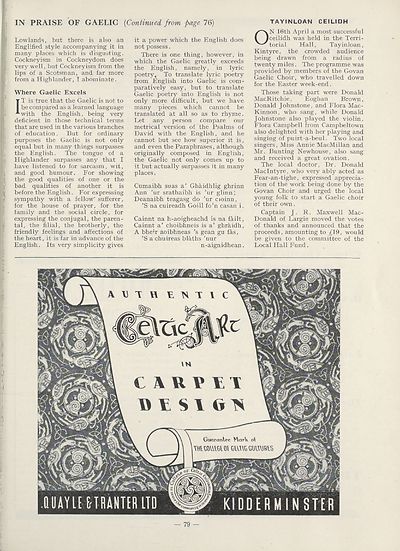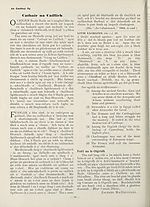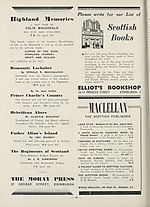An Comunn Gàidhealach Publications > Gaidheal > Volumes 44--45, January 1949--December 1950
(133) Advertisement
Download files
Complete book:
Individual page:
Thumbnail gallery: Grid view | List view

IN PRAISE OF GAELIC {Continued from page 76)
TAYINLOAN CEILIDH
I Lowlands, but there is also an
t Englified style accompanying it in
‘ many places which is disgusting,
j Cockneyism in Cockneydom does
very well, but Cockneyism from the
i lips of a Scotsman, and far more
i from a Highlander, I abominate.
Where Gaelic Excels
IT is true that the Gaelic is not to
be conipared as a learned language
.. with the English, being very
I deficient in those technical terms
|j that are used in the various branches
of education. But for ordinary
1 purposes the Gaelic is not only
I equal but in many things surpasses
j the English. The tongue of a
|j Highlander surpasses any that I
« have listened to for sarcasm, wit,
i and good humour. For showing
the good qualities of one or the
B bad qualities of another it is
|j before the English. For expressing
sympathy with a fellow' sufferer,
for the house of prayer, for the
family and the social circle, for
expressing the conjugal, the paren-
H tal, the filial, the brotherly, the
i friendly feelings and affections of
I; the heart, it is far in advance of the
I English. Its very simplicity gives
it a power which the English does
not possess.
There is one thing, however, in
which the Gaelic greatly exceeds
the English, namely, in lyric
poetry. To translate lyric poetry
from English into Gaelic is com¬
paratively easy, but to translate
Gaelic poetry into English is not
only more difficult, but we have
many pieces which cannot be
translated at all so as to rhyme.
Let any person compare our
metrical version of the Psalms of
David with the English, and he
cannot but see how superior it is,
and even the Paraphrases, although
originally composed in English,
the Gaelic not only comes up to
it but actually surpasses it in many
places.
Cumaibh suas a’ Ghaidhlig ghrinn
Ann ’ur srathaibh is ’ur glinn;
Deanaibh teagasg do ’ur cioinn,
’S na cuireadh Goill fo’n casan i.
Cainnt na h-aoigheachd is na failt,
Cainnt a’ choibhneis is a’ ghraidh,
A bheir aoibhneas ’s gean gu fas,
’S a chuireas blkths 'nur
n-aignidhean.
ON 16th April a most successful
ceilidh was held in the Terri¬
torial Hall, Tayinloan,
Kintyre, the crowded audience
being drawn from a radius of
twenty miles. The programme was
provided by members of the Govan
Gaelic Choir, who travelled down
for the Easter week-end.
Those taking part were Donald
MacRitchie, Eoghan Brown,
Donald Johnstone, and Flora Mac¬
Kinnon, who sang, while Donald
Johnstone also played the violin.
Flora Campbell from Campbeltown
also delighted with her playing and
singing of puirt-a-beul. Two local
singers, Miss Annie MacMillan and
Mr. Bunting Newhouse, also sang
and received a great ovation.
The local doctor, Dr. Donald
MacIntyre, who very ably acted as
Fear-an-tighe, expressed apprecia¬
tion of the work being done by the
Govan Choir and urged the local
young folk to start a Gaelic choir
of their own.
Captain J. R. Maxwell Mac¬
Donald of Largie moved the votes
of thanks and announced that the
proceeds, amounting to ^19, would
be given to the committee of the
Local Hall Fund.
— 79 -
TAYINLOAN CEILIDH
I Lowlands, but there is also an
t Englified style accompanying it in
‘ many places which is disgusting,
j Cockneyism in Cockneydom does
very well, but Cockneyism from the
i lips of a Scotsman, and far more
i from a Highlander, I abominate.
Where Gaelic Excels
IT is true that the Gaelic is not to
be conipared as a learned language
.. with the English, being very
I deficient in those technical terms
|j that are used in the various branches
of education. But for ordinary
1 purposes the Gaelic is not only
I equal but in many things surpasses
j the English. The tongue of a
|j Highlander surpasses any that I
« have listened to for sarcasm, wit,
i and good humour. For showing
the good qualities of one or the
B bad qualities of another it is
|j before the English. For expressing
sympathy with a fellow' sufferer,
for the house of prayer, for the
family and the social circle, for
expressing the conjugal, the paren-
H tal, the filial, the brotherly, the
i friendly feelings and affections of
I; the heart, it is far in advance of the
I English. Its very simplicity gives
it a power which the English does
not possess.
There is one thing, however, in
which the Gaelic greatly exceeds
the English, namely, in lyric
poetry. To translate lyric poetry
from English into Gaelic is com¬
paratively easy, but to translate
Gaelic poetry into English is not
only more difficult, but we have
many pieces which cannot be
translated at all so as to rhyme.
Let any person compare our
metrical version of the Psalms of
David with the English, and he
cannot but see how superior it is,
and even the Paraphrases, although
originally composed in English,
the Gaelic not only comes up to
it but actually surpasses it in many
places.
Cumaibh suas a’ Ghaidhlig ghrinn
Ann ’ur srathaibh is ’ur glinn;
Deanaibh teagasg do ’ur cioinn,
’S na cuireadh Goill fo’n casan i.
Cainnt na h-aoigheachd is na failt,
Cainnt a’ choibhneis is a’ ghraidh,
A bheir aoibhneas ’s gean gu fas,
’S a chuireas blkths 'nur
n-aignidhean.
ON 16th April a most successful
ceilidh was held in the Terri¬
torial Hall, Tayinloan,
Kintyre, the crowded audience
being drawn from a radius of
twenty miles. The programme was
provided by members of the Govan
Gaelic Choir, who travelled down
for the Easter week-end.
Those taking part were Donald
MacRitchie, Eoghan Brown,
Donald Johnstone, and Flora Mac¬
Kinnon, who sang, while Donald
Johnstone also played the violin.
Flora Campbell from Campbeltown
also delighted with her playing and
singing of puirt-a-beul. Two local
singers, Miss Annie MacMillan and
Mr. Bunting Newhouse, also sang
and received a great ovation.
The local doctor, Dr. Donald
MacIntyre, who very ably acted as
Fear-an-tighe, expressed apprecia¬
tion of the work being done by the
Govan Choir and urged the local
young folk to start a Gaelic choir
of their own.
Captain J. R. Maxwell Mac¬
Donald of Largie moved the votes
of thanks and announced that the
proceeds, amounting to ^19, would
be given to the committee of the
Local Hall Fund.
— 79 -
Set display mode to:
![]() Universal Viewer |
Universal Viewer | ![]() Mirador |
Large image | Transcription
Mirador |
Large image | Transcription
| An Comunn Gàidhealach > An Comunn Gàidhealach Publications > Gaidheal > Volumes 44--45, January 1949--December 1950 > (133) Advertisement |
|---|
| Permanent URL | https://digital.nls.uk/127123632 |
|---|
| Description | This contains items published by An Comunn, which are not specifically Mòd-related. It includes journals, annual reports and corporate documents, policy statements, educational resources and published plays and literature. It is arranged alphabetically by title. |
|---|
| Description | A collection of over 400 items published by An Comunn Gàidhealach, the organisation which promotes Gaelic language and culture and organises the Royal National Mòd. Dating from 1891 up to the present day, the collection includes journals and newspapers, annual reports, educational materials, national Mòd programmes, published Mòd literature and music. |
|---|---|
| Additional NLS resources: |
|

